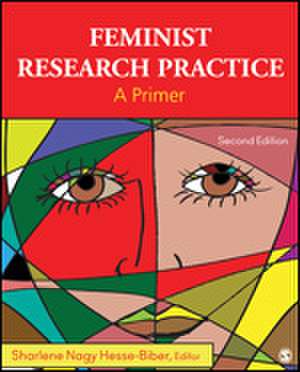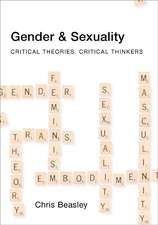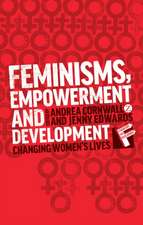Feminist Research Practice: A Primer
Editat de Sharlene Hesse Biberen Limba Engleză Paperback – 29 iul 2013
Preț: 696.59 lei
Preț vechi: 941.35 lei
-26% Nou
Puncte Express: 1045
Preț estimativ în valută:
133.29€ • 139.67$ • 110.19£
133.29€ • 139.67$ • 110.19£
Carte disponibilă
Livrare economică 21 martie-04 aprilie
Livrare express 06-12 martie pentru 38.20 lei
Preluare comenzi: 021 569.72.76
Specificații
ISBN-13: 9781412994972
ISBN-10: 1412994977
Pagini: 456
Ilustrații: illustrations
Dimensiuni: 187 x 232 x 23 mm
Greutate: 0.75 kg
Ediția:Second Edition
Editura: SAGE Publications
Colecția Sage Publications, Inc
Locul publicării:Thousand Oaks, United States
ISBN-10: 1412994977
Pagini: 456
Ilustrații: illustrations
Dimensiuni: 187 x 232 x 23 mm
Greutate: 0.75 kg
Ediția:Second Edition
Editura: SAGE Publications
Colecția Sage Publications, Inc
Locul publicării:Thousand Oaks, United States
Recenzii
“The fully revised and updated Second Edition… draws on the expertise of a wide group of interdisciplinary scholars who aim to cover cutting-edge research methods and explore research questions related to the complex and diverse issues that deeply impact women’s lives…it will be valuable for academics already working from or looking to develop their understanding and use of feminist research practices…this collection offers an engaging look at feminist research practice. It is particularly strengthened by examples of feminist research in practice throughout, and the addition of exercises and resources to initiate further discussion and reflection.” (To Read the entire review click here.)
“This strength of this text rests in the coverage given to multiple methodological approaches. Students who read all the articles will come away with a strong foundation to help them apply a feminist lens and framework to their own research and writing.”
—Rachel Sutz Pienta, Valdosta State University
“The Behind-the-Scenes parts really capture students’ attention and help students see theory and method in practice...”
—M. Cristina Alcalde, University of Kentucky
“The key strength of this text for me is the organization of the book and the Behind-the-Scenes textboxes within the chapters.”
—Arlene Sgoutas, Metropolitan State College of Denver
“It is well organized—introduction, application and synopsis. I like the way different authors cover different methods so you are truly getting people who know and use the methods.”
—Jo Reger, Oakland University
“This is the most inclusive and accessible primer on feminist research methods out there. In addition, the book is adaptable to many different points of focus that instructors might have; that is, it would work well with supplemental readings or other texts that have a more specific focus.”
—M. Joan McDermott, Southern Illinois University Carbondale
“This is one of the most well organized books that I teach. I especially appreciate how each chapter in Section 2 focuses on a different feminist research method and provides examples of how scholars have used this method in their own research. I find that students have a much easier time grasping methodological concepts when they can read about the theory behind a particular method and examples all in the same chapter. I also use chapters 1, 3 and 4 to frame the debates and stakes within the field of feminist research methods.”
—Lena McQuade, Sonoma State University
“Its organization is coherent and logical. The text provides a good introduction to the feminist scholarship and includes theoretical and empirical articles, which provides a well-rounded discussion of the research disciplinary practices for students.”
—Ann Marie Nicolosi, The College of New Jersey
“Key strengths are coverage of interviewing, feminist ethnography, and the practice of program evaluation. Particularly clear and useful for students is the chapter on in-depth interviewing.”
—Julia L. Offen, Cornell University
“I think the book does a great job of showing how feminist thought influences how researchers do research on a practical level—and I think this is something that other qual text books do not always do so well. It’s easier to explain a critical perspective, but how that perspective actually influences the researcher in the field can be harder to show. I really liked how possible research questions were used in the post-modern chapters to illustrate how, in practice, these theoretical perspectives actually shape how social scientists go about their research. Also, the chapter on media analysis did a great job of linking theory to practical discussions of the research process. And the chapter on focus groups does a great job of differentiating market research use of focus groups which is important because most students would probably only have exposure to focus groups in that context…The concluding chapter also did a great job of summarizing the steps of the research process, helpful hints, and the feminist perspective of the book.”
—Karrie Ann Snyder, Northwestern University
“The text’s combination of feminist focus and practical method guidance can be invaluable for truly engaging qualitative research students in their research concepts and tasks.”
—Jeanne Bickford, University of California, Irvine
“The volume features great examples to which students can relate. References to popular culture (e.g., Law and Order) and insightful stories from the field are a wonderful means of keeping students’ attention and reinforcing the continuing relevance of feminist methods. The volume also balances coverage of theoretical and epistemological concerns with practical techniques and tips. The writing style is engaging and the technical terminology is clearly defined.”
—John P. Bartkowski, University of Texas at San Antonio
“Chapter 8 on the practice of feminist focus groups provides new insights along with critique of a type of methodology that is rarely addressed in feminist methodologies texts or courses. The examples are very helpful. New researchers would appreciate the examples of processes and questions...”
—Karen T. Keifer-Boyd, The Pennsylvania State University
“This strength of this text rests in the coverage given to multiple methodological approaches. Students who read all the articles will come away with a strong foundation to help them apply a feminist lens and framework to their own research and writing.”
—Rachel Sutz Pienta, Valdosta State University
“The Behind-the-Scenes parts really capture students’ attention and help students see theory and method in practice...”
—M. Cristina Alcalde, University of Kentucky
“The key strength of this text for me is the organization of the book and the Behind-the-Scenes textboxes within the chapters.”
—Arlene Sgoutas, Metropolitan State College of Denver
“It is well organized—introduction, application and synopsis. I like the way different authors cover different methods so you are truly getting people who know and use the methods.”
—Jo Reger, Oakland University
“This is the most inclusive and accessible primer on feminist research methods out there. In addition, the book is adaptable to many different points of focus that instructors might have; that is, it would work well with supplemental readings or other texts that have a more specific focus.”
—M. Joan McDermott, Southern Illinois University Carbondale
“This is one of the most well organized books that I teach. I especially appreciate how each chapter in Section 2 focuses on a different feminist research method and provides examples of how scholars have used this method in their own research. I find that students have a much easier time grasping methodological concepts when they can read about the theory behind a particular method and examples all in the same chapter. I also use chapters 1, 3 and 4 to frame the debates and stakes within the field of feminist research methods.”
—Lena McQuade, Sonoma State University
“Its organization is coherent and logical. The text provides a good introduction to the feminist scholarship and includes theoretical and empirical articles, which provides a well-rounded discussion of the research disciplinary practices for students.”
—Ann Marie Nicolosi, The College of New Jersey
“Key strengths are coverage of interviewing, feminist ethnography, and the practice of program evaluation. Particularly clear and useful for students is the chapter on in-depth interviewing.”
—Julia L. Offen, Cornell University
“I think the book does a great job of showing how feminist thought influences how researchers do research on a practical level—and I think this is something that other qual text books do not always do so well. It’s easier to explain a critical perspective, but how that perspective actually influences the researcher in the field can be harder to show. I really liked how possible research questions were used in the post-modern chapters to illustrate how, in practice, these theoretical perspectives actually shape how social scientists go about their research. Also, the chapter on media analysis did a great job of linking theory to practical discussions of the research process. And the chapter on focus groups does a great job of differentiating market research use of focus groups which is important because most students would probably only have exposure to focus groups in that context…The concluding chapter also did a great job of summarizing the steps of the research process, helpful hints, and the feminist perspective of the book.”
—Karrie Ann Snyder, Northwestern University
“The text’s combination of feminist focus and practical method guidance can be invaluable for truly engaging qualitative research students in their research concepts and tasks.”
—Jeanne Bickford, University of California, Irvine
“The volume features great examples to which students can relate. References to popular culture (e.g., Law and Order) and insightful stories from the field are a wonderful means of keeping students’ attention and reinforcing the continuing relevance of feminist methods. The volume also balances coverage of theoretical and epistemological concerns with practical techniques and tips. The writing style is engaging and the technical terminology is clearly defined.”
—John P. Bartkowski, University of Texas at San Antonio
“Chapter 8 on the practice of feminist focus groups provides new insights along with critique of a type of methodology that is rarely addressed in feminist methodologies texts or courses. The examples are very helpful. New researchers would appreciate the examples of processes and questions...”
—Karen T. Keifer-Boyd, The Pennsylvania State University
Cuprins
Chapter 1. A Re-Invitation to Feminist Research - Sharlene Hesse-Biber
Chapter 2. Feminist Empiricism and Standpoint Theory: Approaches to Understanding the Social World - Nancy A. Naples and Barbara Gurr
Chapter 3. Feminist Postmodernism, Poststructuralism and Critical Theory - Nollaig Frost and Frauke Elichaoff
Chapter 4. Ethics and Feminist Research - Linda Bell
Chapter 5. What Is Feminist Ethnography? - Elana D. Buch and Karen M. Staller
Chapter 6. Feminist Practice of Action and Community Research - M. Brinton Lykes and Alison Crosby
Chapter 7. Feminist Approaches to In-Depth Interviewing - Sharlene Hesse-Biber
Chapter 8. The Practice of Feminist Focus Groups - Jennie Munday
Chapter 9. Feminist Media Research - Heather McIntosh and Lisa M. Cuklanz
Chapter 10. Feminist Survey Research - Kathi Miner and Toby Jayaratne
Chapter 11. The Feminist Practice of Program Evaluation - Donna M. Mertens and Nichole Stewart
Chapter 12. Feminist Approaches to Mixed Methods Research - Sharlene Hesse-Biber
Chapter 13. Conclusion: Putting Together Your Research Project - Sharlene Hesse-Biber
Chapter 2. Feminist Empiricism and Standpoint Theory: Approaches to Understanding the Social World - Nancy A. Naples and Barbara Gurr
Chapter 3. Feminist Postmodernism, Poststructuralism and Critical Theory - Nollaig Frost and Frauke Elichaoff
Chapter 4. Ethics and Feminist Research - Linda Bell
Chapter 5. What Is Feminist Ethnography? - Elana D. Buch and Karen M. Staller
Chapter 6. Feminist Practice of Action and Community Research - M. Brinton Lykes and Alison Crosby
Chapter 7. Feminist Approaches to In-Depth Interviewing - Sharlene Hesse-Biber
Chapter 8. The Practice of Feminist Focus Groups - Jennie Munday
Chapter 9. Feminist Media Research - Heather McIntosh and Lisa M. Cuklanz
Chapter 10. Feminist Survey Research - Kathi Miner and Toby Jayaratne
Chapter 11. The Feminist Practice of Program Evaluation - Donna M. Mertens and Nichole Stewart
Chapter 12. Feminist Approaches to Mixed Methods Research - Sharlene Hesse-Biber
Chapter 13. Conclusion: Putting Together Your Research Project - Sharlene Hesse-Biber
Descriere
An easy-to-use primer looking at an area that has frequently been neglected in standard research methods books.













